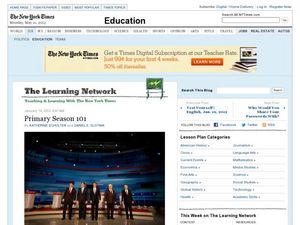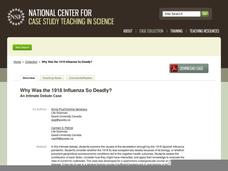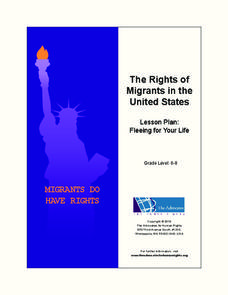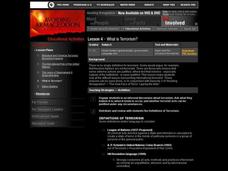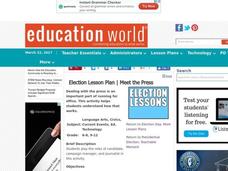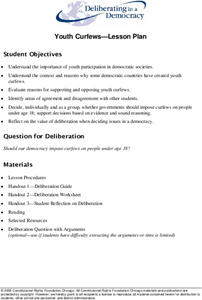Curated OER
Abraham Lincoln, the 1860 Election, and the Future of the American Union and Slavery
Students examine the political alternatives regarding the spread of slavery and the preservation of the American union facing the American people in the decade leading up to the 1860 presidential election.
Curated OER
Primary Season 101
While this New York Times resource posted several months ago it could still be a useful learning experience. Learners practice using the Times's Campaign 2012 Politics section to help them answer 16 questions about the Republican...
Curated OER
What's Legal with Music on the Web?
Student research legalities of downloading music from Internet, gather information on citizens who have been charged with downloading/copyright crimes, find out who is working to create new laws dealing with this technology, explore what...
National Center for Case Study Teaching in Science
Why Was the 1918 Influenza So Deadly?
Which factor was more influential in the 1918 flu epidemic: biology, or social and political conditions? Your AP biology class will research and debate one of these positions in an interesting and challenging lesson. Intended for...
Curated OER
Tobacco in North Carolina
Fourth graders examine the depiction of North Carolina tobacco farms in several photographs. They work in small groups to prepare an argument for a class debate and create promotional signs to advertise their point of view about tobacco...
Curated OER
The Missouri Compromise of 1820
Students use a map of the Missouri Compromise to explain the geographical changes it brought to the U.S. and why the changes provoked a debate over the expansion of slavery in the U.S.
Curated OER
Napoleon!
Present the life and times of Napoleon to your World History class. This is a very complete slide-show that high-lights the key events, players, and politics that lead to the rise and fall of Napoleon Bonaparte. There are many rich and...
Alabama Department of Archives and History
Voting Rights for Alabama Women
What were the arguments put forth by those who opposed the 19th Amendment? For those in favor? Class members examine primary source materials that illustrate the intense debate in Alabama about women's suffrage.
Practical Action
Climate Change - Who's In Control?
How can both individuals and governments respond to climate change and take responsibility to reduce its effects on our environment? Here you will find three lessons filled with discussion, debate, and role-playing...
National Wildlife Federation
Why All the Wiggling on the Way Up? CO2 in the Atmosphere
The climate change debate, in the political arena, is currently a hot topic! Learners explore carbon dioxide levels in our atmosphere and what this means for the future in the 11th installment of 12. Through an analysis of carbon dioxide...
Advocates for Human Rights
The Rights of Migrants in the United States Lesson Plan: Fleeing for Your Life
A role-playing scenario has middle-schoolers imagining that they are refugees forced to flee their community and integrate into a new one. Then, some play the roles of members of the new community and the class brainstorms ideas about...
Curated OER
Avoiding Armageddon
PBS has written a series of lessons on avoiding Armageddon. This is lesson 4 of 5 and focuses on defining terrorism. Upper graders watch episode 3 of "Avoiding Armageddon - The New Face of Terror," read how terrorism is defined by the...
Curated OER
Lincoln is in the House! ("Name-Dropping" Poems and the Power of Connotation)
“What’s in a name?” Just about everything. Barack Obama, Vincent van Gogh, Justin Bieber. Famous names evoke a multitude of reactions and poets often use the names of famous people in their works precisely because names carry...
City University of New York
Women's Suffrage and World War I
Democracy cannot exist where not everyone has equal rights. Discuss the state of democracy and women's suffrage during World War I with class discussions, debates, and primary source analysis, in order for class members to connect with...
Constitutional Rights Foundation
Naturalized Citizens and the Presidency
Article II, Section 1 of the U.S. Constitution takes center stage in a lesson plan that asks class members to assume the role of state senators, debate a resolution to amend the U. S. Constitution to permit naturalized citizens to run...
Center for History Education
How Did the Public View Women’s Contributions to the Revolutionary War Effort?
Calling upon the legacies of Joan of Arc, Elizabeth I, and Catherine the Great, Esther Reed rallied Southern women to support the American Revolution. Using a broadside by Reed and other primary sources, such as poetry, young historians...
Curated OER
Meet the Press
Students participate in a role play revolving around political elections. The roles of candidate, campaign manager, and journalist emphasized in this activity. Students listen to candidate interviews that are available online.
Curated OER
Changing Planet: Infectious Diseases Classroom Activity
Here is a different approach: emerging epidemiologists first go home to interview family on the topic of infectious disease. Then they come to class and view a video and PowerPoint that explore how climate change may increase the...
Curated OER
Humor and Anthropology/Ethnic Humor
By posing controversial questions about racially charged words and jokes, this presentation explores the function and use of ethnic humor. Sure to inspire debates and discussions in your sociology or anthropology class, the slideshow...
National Endowment for the Humanities
Lesson 2: The United States, France, and the Problem of Neutrality, 1796–1801
While the French Revolution could be considered inspired by the American Revolution, it created thorny problems for the new United States. Should the United States get involved and be drawn into a European drama? Was the US strong...
Pulitzer Center
International Aid and Fragile States
"States suffering from internal conflict, weak infrastructures, lack of economic development, and general instability are emerging as a large threat to the international security." What factors contribute to the creation of a fragile...
Deliberating in a Democracy
Youth Curfews
Don't stay out too late! Scholars analyze the need for youth curfews in a democratic society. They examine primary documents, case studies, and short video clips to form their opinions and take a position on the issue. Holding a class...
Curated OER
The Cricket World Cup
Students explore the influence of politics on the Cricket World Cup. Students research and gather information on the World Cup. They create a report on their findings. Students debate why England should or should not stay out of...
Curated OER
The Commission of Inquiry
Students explore the role and functions of a commission of inquiry and participate in a democratic debate.



